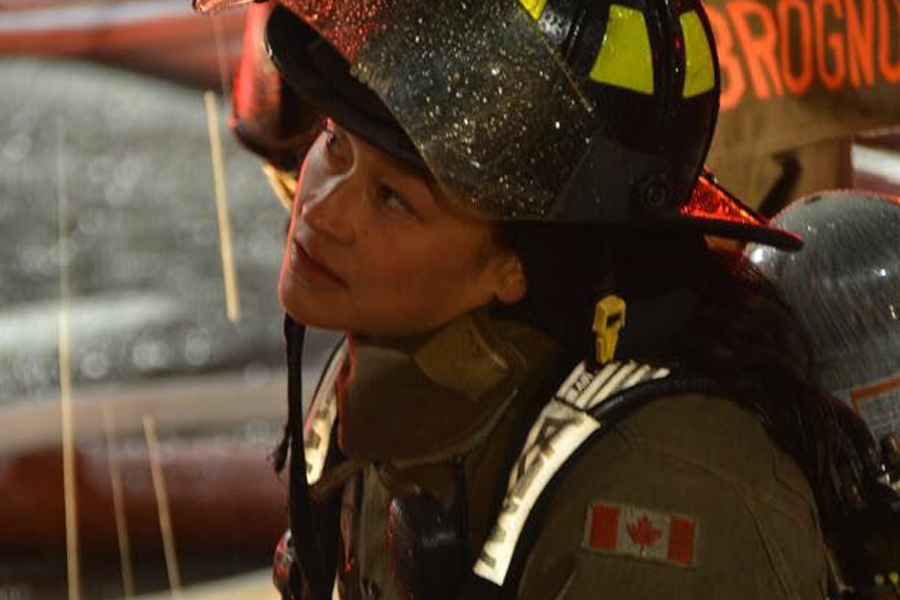By Bernice Halsband
There is no doubt that liability ties into safety. For Fire Chiefs across the nation the race against modernity is an ongoing challenge. The staggering cost of injuries, both in monetary and time value, can be detrimental.Psychological scars represent a significant burden to the crews left behind when one of their own is burned.
We are only now beginning to understand the chain reaction of what happens when firefighters are burned on the fireground. The cause and effect is often a long journey that starts before a crew has even been dispatched to a fire.
From bunker gear design to IMS, building materials and fuel load, from injury to recovery – weeks, months, or even years can go by. All these factors must be considered when assessing the true cost of burns incurred on the fireground, and not the least to mention is liability.
It seems at times as if there have been more changes to the face of firefighting in the past 20 years than we can keep up with, and no one can claim ignorance. Studies are showing a scientific basis for making prevention and education a key component to any fire chief’s toolbox.
One topic that frequently garners attention involves new materials; they burn faster and more toxic than ever. Of the estimated seven million chemicals recognized in existence (GAO 1994b) the TSCA (Toxic Substance Control Act) reported 73,757 chemicals manufactured for commercial use in 2001.
These and other unique challenges introduced by modern life will have to be tackled through research and education. Even though we are acutely aware that the risk of fires has increased, there are still many misconceptions and tons of misinformation among firefighters that jeopardize our safety and the safety of the public we are protecting.
The questions remain: How do you as a chief keep your crews safe? How do you prepare for the worst-case scenario?
One way we have tried to tackle the multitude of problems associated with burns has been through the introduction of, and adherence to, NFPA standards. This has translated into better PPE, more research into fire behaviour, improved health and nutrition, and better fireground tactics.
Despite the enormous progress one simple problem remains – burns.
For the past three years, the University of Toronto Department of Surgery in collaboration with the Sunnybrook Hospital Burn Centre has endeavored to create another option. A burn symposium has been introduced, including a Canada-wide burn registry of any Canadian who has ever been treated for a burn, from the time they were burned to the time they were released from care, and sometimes even beyond that.
This interdisciplinary symposium has a special branch for firefighters. The topics discussed will help to educate firefighters from all over Canada and provide a forum that creates a meaningful dialogue between firefighters and the best of the best in the medical field.
Though in its infancy, this program has expanded exponentially in scope and importance over the past few years. The following topics will be part of this year’s discussion:
- Lionel Crowther of Winnipeg Fire Department will be speaking about how he suffered burns on 70% of his body, including compression burns which few firefighters or paramedics understand
- What we face as fire fighters today: Higher heat release rates, household synthetic fuels
- How Your Bunker Suit works: A clear explanation on the science in your bunker gear that will help fire fighters understand the mechanics and logic behind handling gear when it gets superheated while donned
- Ken Webb of Toronto Fire Services will be presenting Pre-Hospital Care: How to safely handle firefighters from the moment they are extricated from a fire situation to proper handing off to paramedics
- Surgeons talk about best practices for burn care on the scene of an emergency – myths and truths explained and the road to recovery
- ASD/Post Traumatic Stress Disorder (PTSD)
- WSIB – Which forms to fill out and which resources are available
- Support groups after release from the hospital: How to best use resources to help firefighters and families dealing with trauma
- DC Burn Group
The 3rd Annual Canadian Burn Symposium takes place between October 24-25 in Vancouver, B.C. Visit www.cpd.utoronto.ca/cdnburnsymposium for more details.
